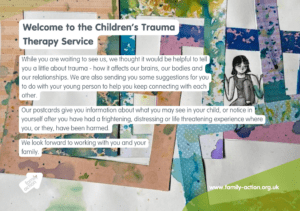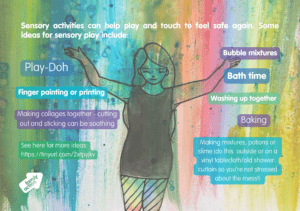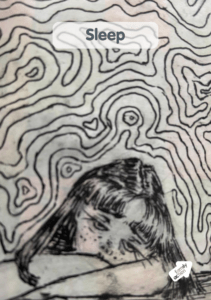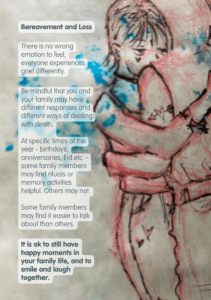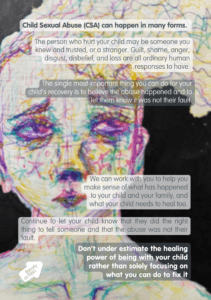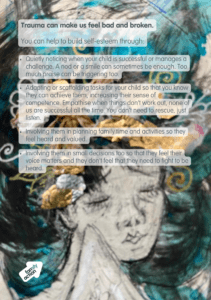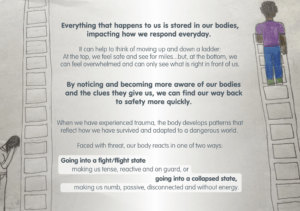This website uses cookies so that we can provide you with the best user experience possible. Cookie information is stored in your browser and performs functions such as recognising you when you return to our website and helping our team to understand which sections of the website you find most interesting and useful.
Children’s Trauma Therapy Service
About us
We are currently open for new referrals.
If your young person is experiencing a mental health crisis please contact First Response on: 0800 952 1181. Alternatively you can visit your GP for support.
The Children’s Trauma Therapy Service, at Bradford Family Action, is a specialist therapy service providing trauma and attachment focussed therapy for children and their families in Bradford District.
We work to help children and their families recover from traumatic experiences including abuse (sexual, emotional, physical, domestic and neglect) and traumatic bereavement. We specialise in working with developmental and complex trauma.
We aim to help children and families to understand their responses to these traumas, and make sense of the impact on their relationships, as they work towards recovery rather than being diagnosis focused.
We welcome self-referrals from families and referrals from professionals. If you /your family, or a family you work with, have a Bradford GP and fall under the above criteria, please do get in touch with us. More information on what to expect from our service is detailed below.
We welcome self-referrals from families and referrals from professionals. If you /your family, or a family you work with, live in the Bradford District CCG area (i.e. have a Bradford GP) and fall under either of the above criteria, please do get in touch with us. More information on what to expect from each stream of our service is detailed below.
Information about referrals we cannot accept:
We are not able to accept referrals for children on a Child Protection Plan due to their primary needs being safety and stabilisation ahead of any therapy work.
If the child is Looked After or on a Special Guardianship Order please be advised that there is a CAMHS LAAC referral pathway.
We are a purely therapeutic service without access to psychiatrists or crisis workers therefore we are not able to hold cases where this is a significant level of mental health risk including: active psychosis, suicidal ideation where there are active plans, intent or recent attempts (within the last 6 months), significant self-harm including restricted eating, An acute mental health crisis including recent hospital admission (within the last 6 months).
FAQ
What is Childhood Sexual Abuse?
Childhood Sexual Abuse (CSA) is defined by Working Together to Safeguard Children (2018) as:
““…forcing or enticing a child or young person to take part in sexual activities, not necessarily involving a high level of violence, whether or not the child is aware of what is happening. The activities may involve physical contact, including assault by penetration (for example, rape or oral sex) or non-penetrative acts such as masturbation, kissing, rubbing and touching outside of clothing. They may also include non-contact activities, such as involving children in looking at, or in the production of, sexual images, watching sexual activities, encouraging children to behave in sexually inappropriate ways, or grooming a child in preparation for abuse [including via the internet] … Sexual abuse is not solely perpetrated by adult males. Women can also commit acts of sexual abuse, as can other children.”
Which children can be referred for recovery-focussed trauma therapy for sexual abuse?
Referred child(ren) or young people should now be safe from sexual abuse, sexual exploitation and other forms of abuse or harm. They should be aged 4 -18 at the time of referral and should be supported by a trusted adult who believes their disclosure.
What is traumatic bereavement?
A traumatic bereavement is one normally associated with sudden, unexpected or traumatic death. An individual or family could be considered to have experienced a traumatic bereavement if they have experienced any one or more of the following: loss through suicide, homicide or other traumatic /violent event; if they have been involved in the care of a severely ill close family member who passed away from their illness; if the death was sudden or unexpected and they are now presenting with trauma symptoms as a result of this loss. In addition, the process of grieving can become more complicated – or traumatic – if there were existing difficulties in attachment or a history of trauma in the family which are compounded by the bereavement.
Although grief and loss are a universal experience, ‘traumatic grief’ usually occurs in response to the types of losses defined above and is a way of describing thoughts, feelings and reactions which are more traumatic (trauma symptoms) than the universal experience of mourning following a death.
What happens after I make a referral?
Following acceptance of a referral, we offer an initial clinical assessment to the referred family. Following assessment, we may make an offer of direct therapy to the family (with their agreement) and/ or offer specialist consultation to the professional system supporting the child.
The Children’s Trauma Therapy Service is comprised of a highly skilled team of psychotherapists and counsellors. At present (October 2023), our therapy team is comprised of: Art Psychotherapists, Dramatherapists, a Dance and Movement Psychotherapist, Child and Adult Counsellors and Family and Systemic Psychotherapists. In addition, many of our clinicians have additional training in dyadic (parent-child) or trauma focussed approaches to therapy including DDP. Theraplay and EMDR. As a team, we are able to offer some of the following therapies to referred families:
- 1:1 therapy sessions normally take a creative therapeutic approach, using a range of techniques to support children and young people.
- Dyadic (parent and child) therapy aims to build on positive interactions to strengthen attachment relationships.
- Family Therapy to address the impact of trauma and difficulties in family relationships.
- Trauma-focussed therapy involves using additional therapies to help us process traumatic memories as part of the overall work. In our service, this is normally additional therapies such as EMDR or CATT.
- Therapeutic Parenting: either with individuals or groups of parents. Therapeutic parenting aims to help support and equip parents of children who have experienced trauma. Therapeutic parenting works with an understanding of attachment and trauma in mind.
- Specialist consultation to support key professionals and the system around the child as they plan for the child’s care
Bradford Family Action has a long and proven track record in providing specialist attachment and trauma-focussed therapy to children who have experienced sexual abuse or traumatic grief
How do I find out more or make a referral?
We welcome discussions with young people, parents and professionals about referrals into our service. You can call us on: 01274 651652 and ask for a member of the Children’s Trauma Therapy Service or send an email to [email protected].
You can access our referral forms and information here:
Download our postcards
